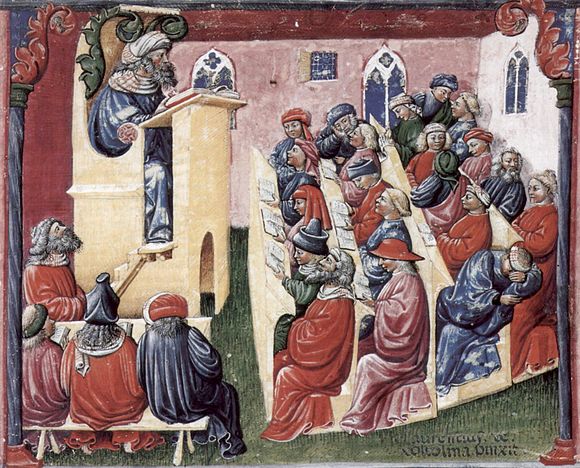1277
Bishop Tempier condemns 219 propositions
Stephen, by divine permission unworthy servant of the church of Paris, sends greetings in the Son of the glorious Virgin to all those who will read this letter. We have received frequent reports, inspired by zeal for the faith, on the part of important and serious persons to the effect that some students of the arts in Paris are exceeding the boundaries of their own faculty and are presuming to treat and discuss, as if they were debatable in the schools, certain obvious and loathsome errors, or rather vanities and lying follies, which are contained in the roll joined to this letter.
Stephen Tempier was Bishop of Paris during a time of great philosophical excitement; the University of Paris was the leading site for an attempt to reconcile the intellectual contributions of Aristotle and his Muslim commentators, with Christian doctrine. Thomas Aquinas and his fellow Dominicans were developing Scholasticism, the dominant intellectual mode of the late Middle Ages, and in the process aroused suspicions that they were treading on to heretical ground. Tempier established a commission to investigate such Aristotelian writings and came up with 219 propositions in the work of thinkers such as Aquinas, Siger of Brabant, and Egidius Romanus that were contrary to orthodoxy.
Some of the objectionable doctrines were:
• That the world is eternal
• That there is only a single intellect
• That one should not hold anything unless it is self-evident or can be manifested from self-evident principles.
• That man should not be content with authority to have certitude about any question.
• That God could not move the heaven in a straight line, the reason being that He would then leave a vacuum.
• That there was no first man, nor will there be a last; indeed, the generation of man from man always was and always will be.
• That our will is subject to the power of the heavenly bodies.
• That it is not true that something comes from nothing or was made in a first creation.
Though this move was meant to be a conservative attack on Aristotle and the dangers he posed to Christian theology, Tempier’s condemnations did little in the short run to stop the study of the Greek philosopher at Paris or elsewhere. However, his actions may have helped spur a tendency to regard Aristotle as untrustworthy and not the unimpeachable source of knowledge that some had come to see him. By freeing some thinkers from the errors of Aristotle, (particularly in his natural science) Tempier seems to have contributed to the rise of experimentation and the Scientific Revolution of the thirteenth century.
